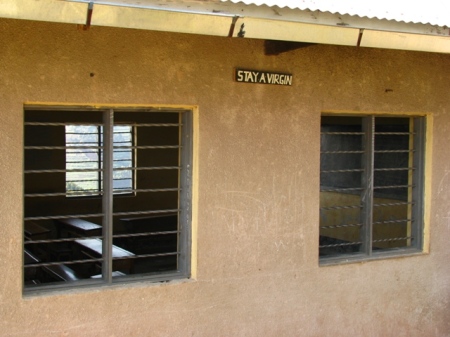Archive for the ‘Education’ Category
Say no to drugs, and…
December 1, 2009Migrant Students
February 8, 2008Like many students in rural Madagascar, Julien Tovondrainy finished primary school at an unusually old age. He started his education later than most city students, who tend to follow the national norms, and he often took breaks to help his family in their rice field, but his parents always made him return to his studies. Finally, at fifteen, he managed to graduate.
At this point his family had a difficult choice to make. Their small village has only a primary school. For Julien to continue his studies, he had to move to attend the nearest middle school, thirty kilometers away in the county capitol. Such a move presented two problems for his family. First, it would reduce the number of people still at home to work in the rice field. Second, as they had no friends or family in the county capitol, it would be difficult for them to support Julien there. At fifteen, he had to move, alone, to a relatively large and unknown town, where he had to live by himself while still just a middle school student. His parents had to sacrifice an experienced worker, and then had to send him food and money once a month to help him survive.
Families all over Madagascar encounter this problem as their children progress through the education system. Students have to move after each level of school if they want to continue their studies. Many villages have a primary school, a few towns even have a middle school, but most counties have only one high school in the capitol. Students have to migrate, in turn, from village, to town, to small city. The villages and the poor families who live there lose their young laborers while the cities receive an influx of rural teenagers with no contacts there and no way to support themselves.
In essence, the system filters all but a select group of privileged city students. Few rural families make the sacrifice to send their children to the city for school. For the students who do attempt the transition, the difficulties of such a move make it hard for them to succeed. It often takes a substantial bribe to pass the national college entrance exam, money that poor rural families just don’t have. For those who do buy or pass the national exam, one final and farflung migration awaits them, to one of the country’s six universities, one in each provincial capitol.
Many of these migrant students have extended family to support them in their new homes, but others do not. These have no choice but to live alone. Some of them even have to play the role of parent for their younger siblings who follow them to the city for school.
Alfred Lague lives with his four younger brothers and sisters in a one room mud hut on a sand lot on the outskirts of town, the poorest part of an already poor settlement. At the age of nineteen, he is responsible for all of his younger siblings.
“I help my brothers and sisters with their homework. I have to cook. I must buy the food. If someone gets ill, I must buy medicine.”
Julien, now nineteen years old, just started high school. He lives with his older brother who moved to the city one year after Julien came alone at the age of fifteen. Like Alfred, he says that his responsibilities at home are overwhelming.
“I have no time for a girlfriend. I have no time for schoolwork because of all my other work.”
I expected Alfred and Julien to tell me all about the joys and misadventures of being young and independent with no authority figures and no rules. I remember being a teenager as one long attempt to get away from my parents and their rules, a quest for independence. We celebrated whenever they left town for the weekend.
Instead, Alfred and Julien spoke of responsibilities and work. They have a very acute sense of the sacrifice that their parents make to allow them to continue their studies. The pubic schools cost little in Madagascar, even for poor rural families, but the lost labor at home costs a lot more.
Both Alfred and Julien receive food and money once a month from their families. If something unusual happens, and the supplies dwindle faster than normal, they send letters, by ox cart, to their parents, who send more food and money.
Because Alfred and his four siblings live in the city, only his parents and two children remain to work the rice field. All nine of them, however, still eat that rice. The same number of people must share a much smaller allotment of food. The weight of his family’s burden rests heavy on Alfred.
“They work a lot to support me and my brothers and sisters. But we still have little food because we have so few people to work the rice field.”
The families gamble that their sacrifice will pay in the end. Each successive level of education provides more opportunities than the last. A student who passes high school, for instance, has a better chance to find work in the city than one who only completes middle school.
When I finished my conversation with Alfred and Julien, I asked them if they wanted to add anything. Alfred spoke at once.
“I do not like it. It is hard for me. It is hard for my family. But I want to study.”
If all goes well, and he passes high school, and continues to university as he hopes, then the current situation will one day reverse itself. Now his family sends him money and food to support him. In the future, he may be sending it to them.













